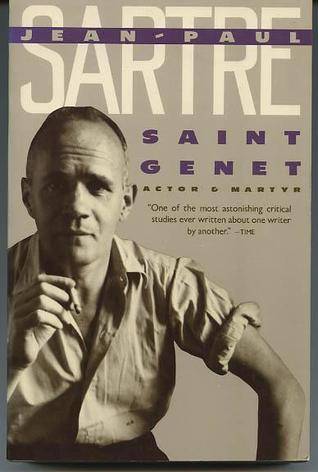

Saint Genet: Actor and Martyr
by Jean-Paul Sartre and Bernard Frechtman
a selection from the beginning of the first section in Book I:? THE MELODIOUS CHILD DEAD IN ME LONG BEFORE THE AX CHOPS OFF MY HEAD Genet is related to that family of people who are nowadays referred to by the barbaric name of pass?istes. 1 An accident riveted him to a childhood memory, and this memory became sacred. In his early childhood, a liturgical drama was performed, a drama of which he was the officiant: he knew paradise and lost it, he was a child and was driven from his childhood. No doubt this "break" is not easy to localize. It shifts back and forth, at the dictate of his moods and myths, between the ages of ten and fifteen. But that is unimportant. What matters is that it exists and that he believes in it. His life is divided into two heterogeneous parts: before and after the sacred drama. Indeed, it is not unusual for the memory to condense into a single mythical moment the contingencies and perpetual rebeginnings of an individual history. What matters is that Genet lives and continues to relive this period of his life as if it had lasted only an instant. ____________________ 1 Pass?iste: one who is not adapted to the present age, who is not a man of his time, who "lives in the past."--Translator's note. ____________________ ? ? To say "instant" is to say fatal instant. The instant is the reciprocal and contradictory envelopment of the before by the after. One is still what one is going to cease to be and already what one is going to become. One lives one's death, one dies one's life. One feels oneself to be one's own self and another; the eternal is present in an atom of duration. In the midst of the fullest life, one has a foreboding that one will merely survive, one is afraid of the future. It is the time of anguish and of heroism, of pleasure and of destruction. An instant is sufficient to destroy, to enjoy, to kill, to be killed, to make one's fortune at the turn of a card. Genet carries in his heart a bygone instant which has lost none of its virulence, an infinitesimal and sacred void which concludes a death and begins a horrible metamorphosis. The argument of this liturgical drama is as follows: a child dies of shame; a hoodlum rises up in his place; the hoodlum will be haunted by the child. One would have to speak of resurrection, to evoke the old initiatory rites of shamanism and secret societies, were it not that Genet refuses categorically to be a man who has been resuscitated. 2 There was a death, that is all. And Genet is nothing other than a dead man. If he appears to be still alive, it is with the larval existence which certain peoples ascribe to their defunct in the grave. All his heroes have died at least once in their life. "After his first murder, Querelle experienced the feeling of being dead. . . . His human form--what is called the envelope of flesh-continued nevertheless to move about on the surface of the earth." His works are filled with meditations on death. The peculiarity of these spiritual exercises is that they almost never concern his future death, his being-to-die, but rather his being-dead, his death as past event. This original crisis also appears to him as a metamorphosis. The well-behaved child is suddenly transformed into a hoodlum, as Gregor Samsa was changed into a bug. Genet's attitude toward this metamorphosis is ambivalent: he both loathes it and yearns for it.
Release Date:
September 11, 1983

